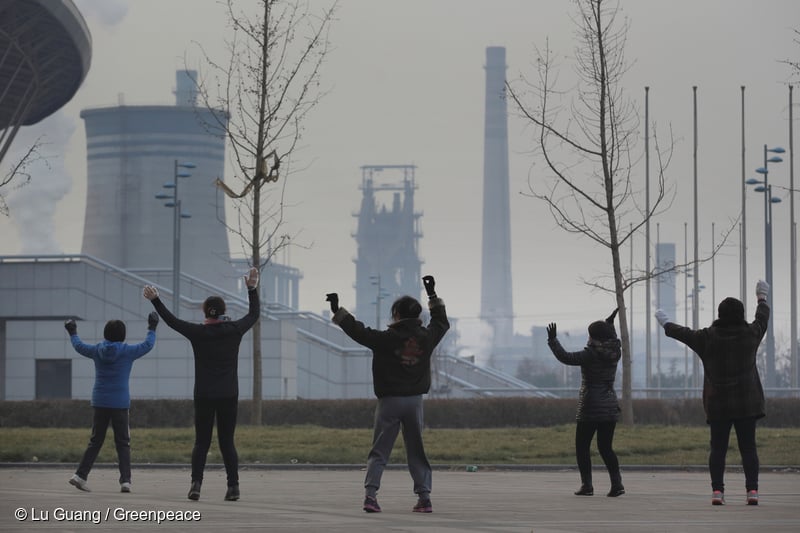SEOUL, 20 April, 2023 – The tech supply chain is a fast-growing but hidden source of carbon emissions, according to a new report published by Greenpeace East Asia. Semiconductor manufacturing, a key step in the tech supply chain, is projected to emit 86 million tonnes of carbon dioxide equivalent (CO2e) globally by 2030, more than Portugal’s total emissions in 2021, the report shows.
“Emissions from electronics manufacturing are soaring, but the companies responsible are hiding from view. Tech giants like Apple depend on TSMC, Samsung and other suppliers to build critical components of their phones and laptops. Both Samsung and TSMC consume more electricity than some entire countries, but they have largely escaped scrutiny in the climate debate despite their reliance on coal and other fossil fuels. TSMC and Samsung need to target 100 percent renewable energy worldwide by 2030, just as their clients Apple and Microsoft have done,” said Greenpeace East Asia Global Tech Project Lead Xueying Wu.
Researchers analyzed electricity consumption, carbon emissions and climate pledges by six of the biggest electronics suppliers in East Asia and forecast their emissions through 2030. They also projected global electricity consumption and emissions for the semiconductor industry as a whole.
Key Findings:
– Semiconductor manufacturing is projected to consume 237 terawatt hours (TWh) of electricity globally by 2030, roughly equivalent to Australia’s 2021 electricity consumption. [1]
–By 2030, Samsung Electronics’ emissions from semiconductor manufacturing alone will exceed 32 million tonnes of CO2e per year, higher than Denmark’s total emissions in 2021. [2] In 2022, nearly 75% of Samsung Electronics’ electricity consumption took place in South Korea. However, Samsung has not issued a 2030 climate commitment for its operations inside South Korea.
-Electricity consumption by Taiwan Semiconductor Manufacturing Company (TSMC) is on track to grow 267% by 2030, the biggest increase of the semiconductor manufacturing companies studied. By 2030, TSMC is on track to consume as much electricity as 5.8 million people, or roughly one fourth of Taiwan’s population. In 2021, renewable energy comprised only 9 percent of TSMC’s total energy usage, far lower than renewable energy usage rates of the chipmaker’s biggest rivals.
– Zero major semiconductor manufacturers, display manufacturers, or final assembly companies have issued climate commitments that are in line with limiting global heating within 1.5 degrees Celsius by 2030.
Semiconductors are key components of the electronics supply chain, from smartphones to artificial intelligence (AI) hardware to automobiles. In 2021, the global semiconductor market was worth $590 billion USD, a figure that was forecast to double by 2030. Semiconductor manufacturing is particularly energy-intensive due to a long and complex manufacturing process.
“Semiconductor conglomerates like TSMC and Samsung have the resources to invest in renewable energy and even to construct their own distributed wind and solar capacity. Air pollution and emissions from the electronics supply chain are disproportionately concentrated in East Asia. TSMC and Samsung have the sway that is needed to accelerate renewable energy development in the region, but they must commit to achieve 100 percent renewable energy by 2030,” said Wu.
END
Notes
Full report available here.
[1] On May 18, 2023, SK Hynix’s electricity consumption, LG Display’s electricity consumption, Korea’s semiconductor industry electricity consumption and overall semiconductor industry electricity consumption data were updated in the report. Semiconductor manufacturing is projected to consume 237 TWh of electricity globally in 2030, instead of 286 TWh as previously stated.
[2] Scope 1 and 2 emissions if Samsung’s existing climate commitments are met.
Media Contacts
Erin Newport, International Communications Officer, Greenpeace East Asia, Taipei, +886 958 026 791, [email protected]
Jungeun Baek, Communications Officer, Greenpeace East Asia, Seoul, +82 10 8857 4093, [email protected]
Jimmy Chen, Communications Officer, Greenpeace East Asia, Taipei, +886 988 035 817, [email protected]



